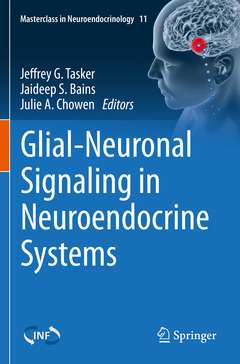Glial-Neuronal Signaling in Neuroendocrine Systems, 1st ed. 2021 Masterclass in Neuroendocrinology Series, Vol. 11

This volume discusses current research on glial-neuronal interactions in several neuroendocrine systems. Glial-neuronal bidirectional transmission represents one of the fastest-growing areas of investigation in neuroscience today.
Unraveling the interactions and signaling synergy between glial cells and neurons is critical to advancing our understanding of brain function. Consequently, this book summarizes the latest findings on the roles of astrocytes, microglia and tanycytes in the control of synaptic transmission, synaptic plasticity, blood-brain signaling, neuroinflammation and immune signaling. In addition, leading experts in the field discuss how reproductive function, the stress response and energy homeostasis are regulated by glial-neuronal communication.
Given its scope, the book is essential reading for undergraduate and graduate students in the neurosciences, as well as postdoctoral fellows and established researchers who are looking for a comprehensive overview of glial-neuronal crosstalk in neuroendocrine systems.
This is the eleventh volume in the International Neuroendocrine Federation (INF) Masterclass in Neuroendocrinology series (Volumes 1-7 published by Wiley), which aims to illustrate the highest standards and highlight the latest technologies in basic and clinical research, and aspires to provide inspiration for further exploration into the exciting field of neuroendocrinology.
Chapter 6 is available open access under a Creative Commons Attribution 4.0 International License via link.springer.com.
PART I. Glial-Neuronal Interactions in the Control of Hypothalamic Development.- The Role of Microglia in the Developing Hypothalamus.- PART II. Glial-Neuronal Interactions in the Control of the Magnocellular Neuroendocrine System.- Functional Consequences of Morphological Plasticity in the Adult Hypothalamo-Neurohypophysial System.- Fenestrated Capillary and Dynamic Neuro-Glial-Vascula Reorganization of the Adult Neurohypophysis.- Astrocyte-Magnocellular Neuron Interactions in Hypothalamic Memory.- The Multifaceted Roles of Hypothalamic Astrocytes and Microglial Cells in Neuroendocrine and Autonomic Regulation in Health and Disease.- PART III. Gial-Neuronal Interactions in the Control of Metabolic Function.- Control of Systemic Metabolism by Astrocytes in the Brain.- Glia-Neuron Communication: Not a One-way Street.- PART IV. Glial-Neuronal Interactions in the Control of the Stress Response.- Retrograde Signaling Via Dendritic Activation of Glial-Neuronal Circuits.- PART V. Glial-Neuronal Interactions in the Control of Reproductive Function.- Microglia, Hormones, and Behavior.- Hypothalamic Astrocytes and the Role of Neuroprogesterone in Estrogen Positive Feedback.- PART VI. Glial-Neuronal Interactions that Link Brain and Periphery.- Unveiling the Importance of Tanycytes in the Control of the Dialogue Between the Brain and the Periphery.- Tanycyte Regulation of Hypophysiotropic TRH Neurons.
Julie A. Chowen received her B.S. from Lake Superior State University in 1982 and her Ph.D. in Physiology from the University of Washington in 1990. She joined Dr. Luis Miguel García-Segura’s laboratory at the Cajal Institute for Neuroscience in Madrid for her postdoctoral research. In 1999 she established her laboratory in the Department of Endocrinology at the Hospital Infantil Niño Jesús in Madrid. Her research focuses on the neuroendocrine control of metabolism, early nutritional and hormonal influences on long-term metabolism and the role of astrocytes in mediating metabolic signals.
Date de parution : 04-2022
Ouvrage de 324 p.
15.5x23.5 cm
Date de parution : 04-2021
Ouvrage de 324 p.
15.5x23.5 cm



